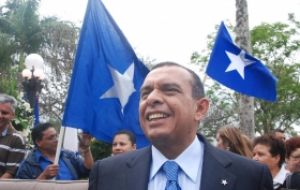MercoPress. South Atlantic News Agency
Honduras election commission takes off; Lobo leads in opinion polls
 Porfirio “Pepe” Lobo, head of the National party holds the key in Congress to restore governance and most probably be elected president Nov. 29
Porfirio “Pepe” Lobo, head of the National party holds the key in Congress to restore governance and most probably be elected president Nov. 29 United States secretary of Labour and a former Chilean president were named Sunday to a commission tasked with monitoring the creation of a power-sharing government in Honduras, under a US-brokered agreement to end the Central American nation's four-month-old political crisis.
Jose Miguel Insulza, the secretary-general of the Organization of American States, said Labour Secretary Hilda Solis and ex-President Ricardo Lagos will arrive in the Central American country Tuesday, accompanied by high-level OAS officials.
Representatives from Honduras' two major political parties will round out the four-member commission, which is also tasked with ensuring that all sides recognize November presidential elections and that the military is put under the command of electoral officials to safeguard the vote's legitimacy.
A key player in the new scenario seems to be the front-runner in Honduras' presidential race. Porfirio “Pepe” Lobo leads polls ahead of the November 29 election and his National Party is the biggest opposition force in Congress, which must decide whether ousted President Manuel Zelaya can return to serve his last months in office.
With hundreds of millions of dollars in foreign aid and international recognition of the election contingent on Zelaya's return, the National Party is under pressure to support him, though its leaders say they are still studying options.
Zelaya, toppled in a June 28 coup, and the de facto leader Roberto Micheletti who replaced him, were pushed by US diplomats to sign a deal last week to put an end to Central America's worst political turmoil in two decades.
Under the deal, the 128 member unicameral Congress is expected to come out of recess to vote on whether Zelaya's proposed return would be constitutional. The Supreme Court will first issue a non-binding opinion and so far no date has been set for the vote in Congress.
It was the Supreme Court that ordered Zelaya's arrest in June -- charging him with illegally trying to hold a referendum to change the constitution -- and Congress then appointed Micheletti to take over hours after the coup. Now the decision to end the crisis is thrown back to both institutions.
Apparently according to the agreement reached under strong pressure from the US with Under Secretary of State Thomas Shannon who flew to Tegucigalpa for three days and left of Friday, a power-sharing government and a congressional decision on Zelaya's brief reinstatement should be decided by Thursday November 5.
Zelaya, a logging magnate, caused fissures in his ruling conservative Liberal Party by moving closer to Venezuela's populist President Hugo Chavez. He denies the accusations that he was trying to change the constitution to extend his term
Micheletti represents the hard-line wing of the Liberal Party, the biggest group in Congress with 62 seats, and it is expected to split on the question of whether Zelaya should return to the presidency until his term ends in January.
This puts the spotlight on the 55 National Party lawmakers, who supported the coup in June but who could now back Zelaya.
“I think it's viable because the parties need stability and need the elections to be recognized,” said Rolando Sierra, a historian at the National Autonomous University of Honduras.
Lobo has a double digit lead in opinion polls but Honduras could remain diplomatically isolated and possibly cut off from foreign aid if Zelaya is not reinstated before the vote.
The US, the European Union and multilateral lenders suspended hundreds of millions of dollars in aid for Honduras, one of the poorest countries in Latinamerica, after the coup. The government budget in the coffee and textile exporting nation is heavily dependent on foreign aid.
The institutional crisis has been a diplomatic headache for the United States and the region's other major power broker, Brazil. Zelaya remains holed in at the Brazilian embassy in Tegucigalpa, where he took refuge after sneaking back into the country under cover in September.
Zelaya's return is “the issue that is going to be the most provocative and the one we'll have to pay more attention” said Assistant Secretary of State Thomas Shannon, before leaving Honduras Friday.




Top Comments
Disclaimer & comment rulesCommenting for this story is now closed.
If you have a Facebook account, become a fan and comment on our Facebook Page!